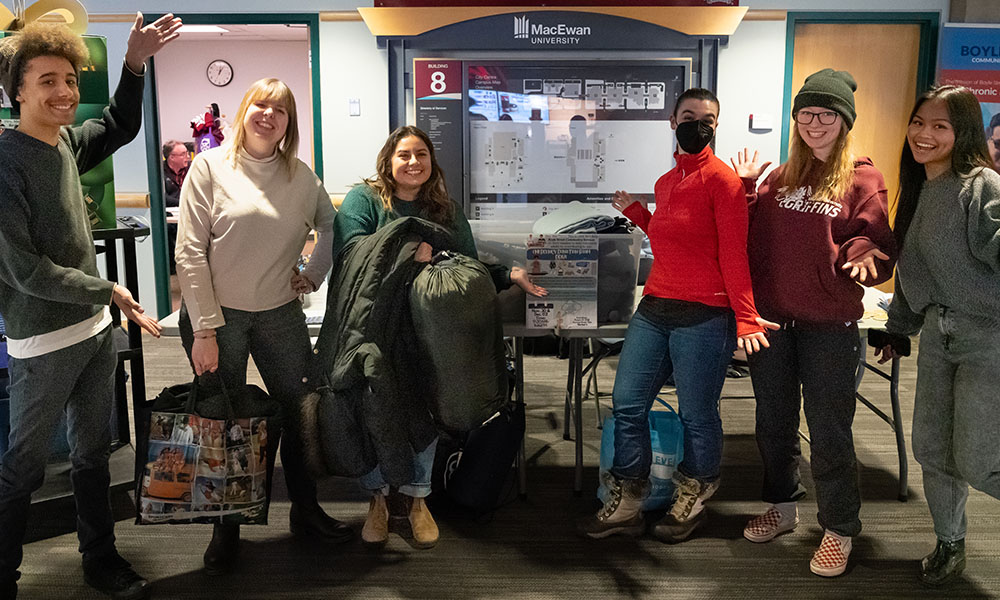Dr. Cynthia Puddu has dedicated much of her career to researching houselessness.
The term houselessness, she notes, varies slightly from the word homelessness. “The four walls around you aren’t necessarily your home. Your home is your community. So for a lot of people, especially the chronically unhoused, being on the street is home for them – there’s a community they’ve built there.”
Dr. Puddu is involved in a number of local initiatives in reducing houselessness, but her research has a much wider reach. In December of 2020, she published a blog on the London School of Economics’ website titled “Homelessness is North America’s pandemic within a pandemic.”
“The pandemic illuminated a lot of systemic issues. People of colour and people in poverty were at a higher risk of getting COVID because of their working conditions and housing conditions, but we also started to see people losing their jobs or their income being reduced,” says the assistant professor in the Faculty of Health and Community Studies at MacEwan. “While in the early stages of the pandemic there were rent controls and rules that people were not allowed to be evicted, we knew those were going to end.”
“When I was writing that post, there wasn’t the inflation we’re seeing now. Housing prices are increasing, but incomes are not increasing at the same rate. Add in the cost of living and it leads to this perfect storm of people not being able to afford rent and losing their homes. In the next year, we’ll probably see the amount of people that are either losing their homes or are at risk of losing their homes increasing significantly,” she says.
It’s a topic Dr. Puddu explores in her INTD 205 class, Social Determinants of Health, where she encourages students to think critically about health, from its definition to the issues that contribute to how achievable a traditional view of health may be. “In class we discuss the social determinants of housing and income inequity and how these are important factors in influencing health, both at an individual and population level. We focus on the importance of systemic change in addressing these determinants, such as increasing affordable housing and living wages.”
But those systemic changes take time, and especially as temperatures continue to lower throughout the winter season, there is an immediate need. So Dr. Puddu and her class held a donation drive for winter clothing items to help fill Boyle Street Community Services’ emergency donation room.
“Boyle Street Community Services is a longtime community research partner of mine,” says Dr. Puddu. “I met with one of their managers, and together we thought it would be helpful for my students to create some educational materials that would help inform people on campus about the needs of the community and why certain items are needed and others cannot be used.”
Often, she says, donations contain impractical items that people simply no longer want. This results in organizations like Boyle Street having to sort through donations to remove things like dress clothes and high-heeled shoes that will not benefit the houseless community that they are looking to help.
The donation drive took place in Building 8 on November 30 and December 2 with students distributing the educational materials they’d created in the class while accepting clothing donations.
For those who were unable to donate to the drive but are still interested in helping to provide winter clothing and other necessities, there are a multitude of ways to get involved this season.
“There are many organizations that are helping over the holidays. People can donate to Boyle Street, Bissell Centre, Niginan Housing Ventures, and a number of others,” says Dr. Puddu.
She adds that, although adequate housing is recognized as a fundamental human right by the federal government, it is impossible to implement changes to ensure that it is provided without having legislation enacted by provincial and municipal governments. Passing policies and bylaws to make it more difficult for foreign investors to purchase housing with the intent to flip it or charge higher rental rates would contribute greatly to keeping housing affordable.
The best way individuals can work to make a difference?
“Advocate for the unhoused community and those in precarious housing by contacting their elected officials and advocating for more affordable housing and stronger social safety nets for all,” says Dr. Puddu.
 READ MORE
READ MORE
